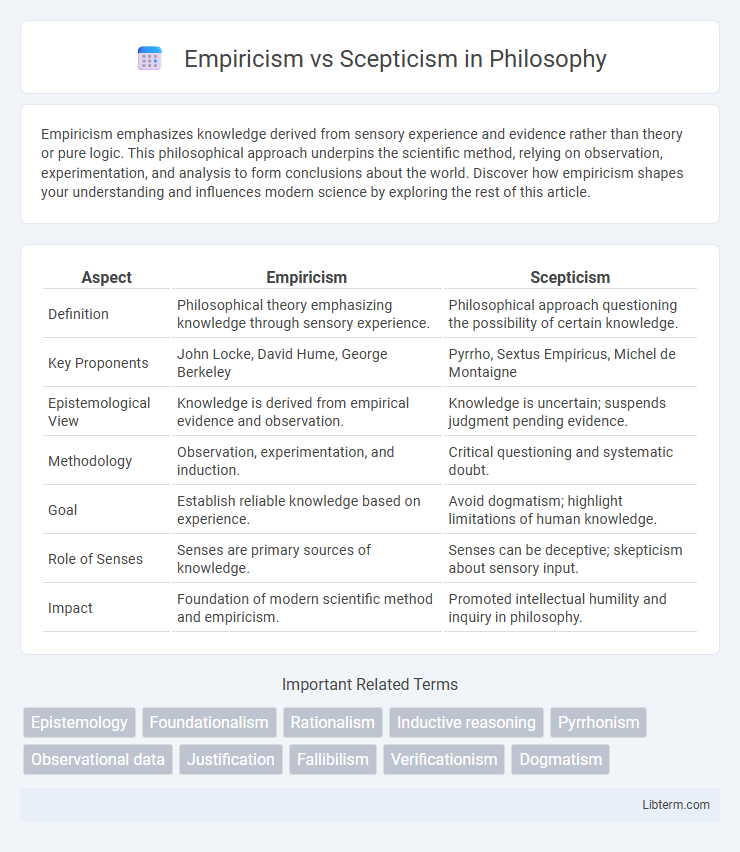Empiricism emphasizes knowledge derived from sensory experience and evidence rather than theory or pure logic. This philosophical approach underpins the scientific method, relying on observation, experimentation, and analysis to form conclusions about the world. Discover how empiricism shapes your understanding and influences modern science by exploring the rest of this article.
Table of Comparison
| Aspect | Empiricism | Scepticism |
|---|---|---|
| Definition | Philosophical theory emphasizing knowledge through sensory experience. | Philosophical approach questioning the possibility of certain knowledge. |
| Key Proponents | John Locke, David Hume, George Berkeley | Pyrrho, Sextus Empiricus, Michel de Montaigne |
| Epistemological View | Knowledge is derived from empirical evidence and observation. | Knowledge is uncertain; suspends judgment pending evidence. |
| Methodology | Observation, experimentation, and induction. | Critical questioning and systematic doubt. |
| Goal | Establish reliable knowledge based on experience. | Avoid dogmatism; highlight limitations of human knowledge. |
| Role of Senses | Senses are primary sources of knowledge. | Senses can be deceptive; skepticism about sensory input. |
| Impact | Foundation of modern scientific method and empiricism. | Promoted intellectual humility and inquiry in philosophy. |
Introduction to Empiricism and Scepticism
Empiricism emphasizes knowledge derived from sensory experience and evidence, asserting that observation and experimentation form the basis of understanding reality. Scepticism challenges the certainty of knowledge claims, promoting continuous questioning and withholding judgment until sufficient evidence is presented. Both philosophies critically influence epistemology, shaping methods of inquiry and criteria for belief acceptance.
Historical Roots of Empiricism
Empiricism, rooted in the works of philosophers like John Locke and David Hume, emphasizes knowledge derived from sensory experience and observation, forming a foundational branch of modern epistemology. Contrasting with Scepticism, which questions the possibility of certain knowledge, Empiricism asserts that empirical evidence is the primary source of understanding reality. The historical development of Empiricism traced back to the Scientific Revolution, where empirical methods became essential in challenging rationalist and dogmatic viewpoints.
Origins and Development of Scepticism
Scepticism originated in ancient Greece with Pyrrho of Elis, who questioned the possibility of certain knowledge, influencing later Hellenistic philosophers. The development of scepticism continued through the Academic Skeptics, who argued that knowledge is uncertain and advocated for suspension of judgment (epoche). This philosophical stance contrasted with empiricism, which emerged more prominently during the Scientific Revolution, emphasizing sensory experience as the foundation of knowledge.
Core Principles of Empiricism
Empiricism centers on the principle that knowledge arises primarily from sensory experience and observation, emphasizing evidence gathered through the five senses as the foundation for understanding reality. It asserts that all ideas and concepts originate from experience rather than innate intuition, promoting a scientific approach grounded in experimentation and verification. Key empiricist philosophers like John Locke and David Hume argue that empirical evidence is essential to forming reliable knowledge, distinguishing empiricism sharply from scepticism, which questions the possibility of certain knowledge altogether.
Key Tenets of Scepticism
Skepticism emphasizes questioning the possibility of certain knowledge, asserting that human senses and reasoning are fallible and often misleading, which challenges the reliability of empirical evidence. Key tenets include the suspension of judgment (epoche), the demand for rigorous evidence before accepting claims, and the continuous inquiry to avoid dogmatism. This philosophical approach promotes critical examination and acknowledges uncertainty as a fundamental aspect of knowledge acquisition.
Major Proponents and Philosophers
Empiricism, championed by philosophers such as John Locke, George Berkeley, and David Hume, emphasizes knowledge derived from sensory experience and observation. In contrast, scepticism, associated with Pyrrho of Elis, Sextus Empiricus, and Michel de Montaigne, challenges the certainty of knowledge, advocating for suspension of judgment due to doubt. Both traditions critically shaped epistemology, with empiricism grounding knowledge in empirical evidence and scepticism questioning the possibility of absolute certainty.
Empirical Methods vs. Skeptical Inquiry
Empirical methods rely on observation, experimentation, and evidence to construct knowledge, emphasizing verification through sensory experience. Skeptical inquiry challenges the certainty of knowledge claims by questioning assumptions, demanding rigorous proof and critical analysis before acceptance. The dynamic between these approaches fosters a balance where empirical evidence grounds understanding, while skepticism ensures continuous scrutiny and refinement of knowledge.
Debates: Knowledge, Belief, and Evidence
Empiricism asserts that knowledge derives primarily from sensory experience, emphasizing observation and evidence as the foundations of justified belief. Scepticism challenges the certainty of knowledge claims, questioning whether beliefs can be adequately supported by evidence to be considered true knowledge. The ongoing debate centers on the criteria for epistemic justification, the reliability of sensory data, and the possibility of attaining absolute certainty in human cognition.
Impact on Modern Science and Philosophy
Empiricism, emphasizing knowledge through sensory experience, laid the foundation for the scientific method, driving advancements in experimental science and evidence-based inquiry. Scepticism challenged uncritical acceptance of claims, fostering critical thinking and rigorous evaluation of evidence that underpin modern scientific and philosophical methodologies. Their interplay shaped contemporary epistemology by balancing empirical evidence with questioning, ultimately influencing the development of scientific inquiry and rational philosophy.
Conclusion: Reconciling Empiricism and Scepticism
Reconciling empiricism and scepticism involves acknowledging the strengths of empirical evidence in acquiring knowledge while maintaining a critical stance that questions the certainty and limits of sensory data. Empiricism emphasizes observation as the foundation for understanding, whereas scepticism urges caution against accepting beliefs without rigorous scrutiny. Integrating both perspectives fosters a balanced approach to knowledge that values evidence but remains open to revision and doubt.
Empiricism Infographic

 libterm.com
libterm.com